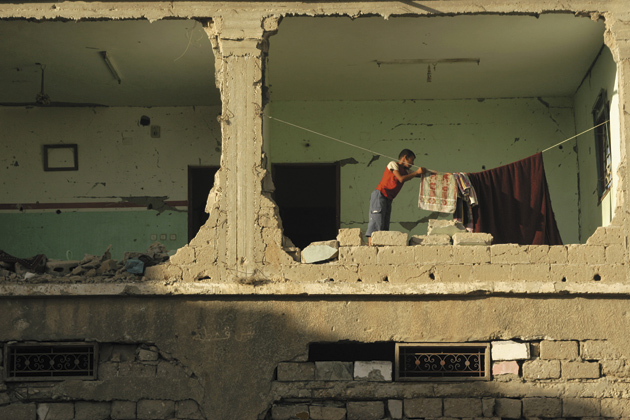In response to:
'Israel & the Rules of War': An Exchange from the June 11, 2009 issue
To the Editors:
I am afraid that Michael Walzer and Avi-shai Margalit, in their exchange with Asa Kasher and Amos Yadlin [NYR, June 11], have been obfuscating the issue of how an army of a democratic state should deal with civilians on the other side of the front (“enemy civilians” in old-fashioned parlance).
There is no doubt that armies have an obligation not to target civilians, difficult as it may be especially under conditions of asymmetrical warfare; and I am willing to grant that during the Gaza war, the Israeli army was in many cases less than meticulous in avoiding casualties among the civilian Palestinian population. But what Walzer and Margalit argue in their hypothetical “Manara scenario” is that an army should take as much care of the life of “enemy civilians” as it takes of the lives of its own civilian population for whose protection and defense it has gone to war.
This seeming equivalence is preposterous, both on moral and political grounds: no army can treat enemy territory, and its population, as it treats its own territory and its population. And no democratically elected political leader can be imagined to maintain that his government will take the same care, and put its own soldiers in danger in the same way, in defending enemy civilians as it does in defending its own civilian population.
The obvious parallel to Israel’s war in Gaza is the current US war in Afghanistan, as undertaken now under President Obama. This will evidently escalate if the US hopes to defeat the Taliban. In this war, the US—just as Israel in Gaza—is using massive airpower, and as is in the nature of such air strikes, in recent weeks large numbers of Afghan civilians were killed: the same happens as a consequence of American air strikes into Pakistani territory. Without going into the details of the American rules of engagement (which unlike the Israeli rules are totally not transparent), I have yet to see any American, philosopher or layman, arguing that the US should take as much care of the lives of Afghan civilians as it takes care of the lives of US citizens in Manhattan, Washington, D.C.—or Princeton—for whose security this war is being waged.
Shlomo Avineri
Department of Political Science
The Hebrew University of Jerusalem
To the Editors:
The framework of Israel’s recent operation in Gaza was shaped by the main lesson that was drawn from the warfare in Lebanon in the summer of 2006: that Israeli society would not stand for another offensive war that would claim heavy casualties. This was, beyond all the sophistry and mental gymnastics, the true goal of the ideological cover, which Yadlin and Kasher provided the government and the army: “Zero casualties for our troops.” It is no coinci- dence that the new moral doctrine became known in ordinary Israeli parlance as “license to kill.”
One instance that accurately reflects the nature of the fighting in Gaza illustrates the attitude of official Israel toward the human destruction that was sown in the war. On January 16, 2009, three daughters of Dr. Ezzeldeen Abu al-Aish, as well as a niece, were killed and two other daughters were wounded when two tank shells hit the family’s home. The incident would not have come to the attention of Israeli public opinion but for the fact that the Gaza physician is known in Israel. After the tragedy, on January 22, an urgent letter of protest, requesting an immediate inquiry, was sent to the minister of defense. On May 19 the defense minister’s departmental staff sent a letter, signed by a ministerial aide, the cynicism of which is matched only by its maliciousness: it said that Dr. Abu al-Aish himself bore sole responsibility for the disaster, for failing to heed the army’s warnings to evacuate.
The letter, of course, does not answer the obvious question: Where was the family supposed to go? The street? The beach? In Gaza’s streets and open areas, any moving figure was automatically assumed to be an enemy combatant and thus a target for Israeli fire. The Defense Ministry does not contradict the doctor’s claim that there were no Hamas or any other militants in the building or on its roof. It only claims that the unit operating in the area identified, on the third floor of the Abu al-Aish home, “figures who aroused the suspicion that they were observing IDF forces and were guiding sniper fire from a different building.” How was the local commander able to determine that the figures were those of Hamas militants rather than members of the household? The answer is that he didn’t, but according to the zero-risk principle, the local commander called in tank fire, while knowing that there would be many casualties inside the building.
Advertisement
That, of course, is the decisive point. The practical result is that according to the new doctrine of warfare and the moral doctrine promulgated by the new IDF, any place, any person, any home in any village and in any neighborhood in which enemy forces operate can be an enemy position and are therefore legitimate targets for Israeli fire. It is the closing of a circle: the moral, if not the criminal, responsibility is borne not by the junior officers who make the decisions in the field, but rather by the senior command that taught them to do so, the senior politicians who approved the new principles, and above all by the ideologues who formulated this doctrine, which brings disgrace upon all of us, especially those of us who fought in previous Israeli wars.
Zeev Sternhell
Léon Blum Professor Emeritus of Political Science
The Hebrew University of Jerusalem
Avishai Margalit and Michael Walzer reply:
Shlomo Avineri makes an important objection to our argument, one that has been made a number of times in other letters sent to The New York Review, for example in the letter by Kasher and Yadlin to which we replied in the June 11 issue.
We certainly don’t argue that “the US should take as much care of the lives of Afghan civilians as it [does] of the lives of US citizens….” The US should provide health care for its own citizens; it has no such obligation to Afghan citizens. And the case is the same for education, unemployment insurance, police protection, and much else. Nor do we argue that Israel should take the same care, accept risks in the same way, or provide protection for foreign civilians as it does for its own civilians. It has to protect its own civilians against any attack, from any quarter. It has to protect foreign civilians only when it is itself attacking.
When one country imposes risks on innocent people in another country, however, it has to take positive measures to minimize those risks—and the measures it has to take are not dependent on the nationality of the innocents. That is our claim. It is demanding, but it isn’t a radically absolutist demand, as our critics suggest.
Zeev Sternhell’s powerful letter speaks for itself. But we would like to add one observation. Judging from the IDF spokesman’s reaction to the exchange between Kasher and Yadlin and Moshe Halbertal and Avi Sagi in the Yediot Ahronot of April 10, the official IDF position is closer to our position than to that of Kasher and Yadlin. We hope that in the future the IDF official position—what Sternhell calls “the old ethical guidelines”—will actually guide troops on the ground, which it obviously did not do in the incident reported in Sternhell’s letter and in other actions during the IDF’s last operation in Gaza.
This Issue
August 13, 2009
When Science & Poetry Were Friends
A Very Chilly Victory




